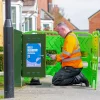BT Brings UK Superfast Broadband Rollout Forward to Spring 2014
BT has today confirmed that its national £2.5bn plan, which aims to deploy fibre optic based superfast broadband (FTTC , FTTP) ISP services to 66% of the UK, has once again been brought forward and will now complete during Spring 2014 (i.e. passing 19 million homes and businesses).
The telecoms operator originally planned to complete its privately funded roll-out by the end of 2015, which was later brought forward to the end of 2014 (October 2011). As a result of today’s announcement BT’s work will now complete a full 18 months earlier than originally planned.
Advertisement
On top of that BT has also confirmed that its superfast broadband services have now passed 12 million UK premises (homes and businesses), which is up from 11m in its previous Q2-2012 results and 10m in its Q1 results. The news suggests that BTOpenreach’s recent delays have not slowed the operator’s fibre deployment.
Ian Livingston, BT’s CEO, said:
“Fibre is at the heart of our broadband plans for both town and country. We plan to step up our efforts yet again to complete our commercial fibre roll-out early as this will allow us to focus even further on the next exciting stage of our fibre broadband strategy. This will see BT working hand in hand with the public sector to extend fibre broadband to UK homes and businesses in the ‘final third’ of the country that are harder to reach.”
BTWholesale has similarly confirmed that 950,000 homes and businesses have now taken the operators superfast broadband service (up from 750,000 in July 2012), which is being delivered via 70 different ISPs. BT’s own Retail division remains the dominant player with a superfast broadband (BTInfinity) customer base of more than 875,000. The Government has naturally welcomed today’s news.
Maria Miller, Secretary of State for Culture, said:
“Our broadband programme is a key element of our growth and investment agenda and a real priority. Fibre technology is a major driver of economic growth and I am delighted to see BT make such good progress in helping to get the UK connected. Connectivity is a key issue for people across the country whether in rural or urban areas and I now look forward to seeing rapid progress in the Government-backed projects to connect hard to reach areas.”
BT claims that the early completion of this footprint, which has been achieved via its own private investment, will enable them to focus further on working with the public sector to extend fibre based services to the “final third” (33%) of the country. This work will be conducted via the state aid supported Broadband Delivery UK (BDUK) project.
The operator has previously indicated that its superfast broadband services could reach 90% of homes and businesses by around 2016 or 2017, albeit only provided it wins the lion’s share of public funding. This looks highly likely to happen since BT’s only real rival in the BDUK process, Fujitsu, has effectively given up.
Advertisement
BT’s FTTC service delivers speeds of up to 80Mbps (Megabits per second), while its niche coverage FTTP solution offers up to 330Mbps. The operator intends to launch an expensive new solution next Spring 2013, called FTTP-On-Demand, which will enable any of their FTTC lines to also gain a full FTTP service.
Mark is a professional technology writer, IT consultant and computer engineer from Dorset (England), he also founded ISPreview in 1999 and enjoys analysing the latest telecoms and broadband developments. Find me on X (Twitter), Mastodon, Facebook, BlueSky, Threads.net and Linkedin.
« MetroNet UK Fibre and Wireless Broadband Covers all of Greater Manchester

















































Comments are closed